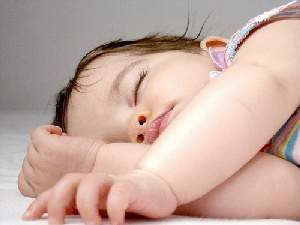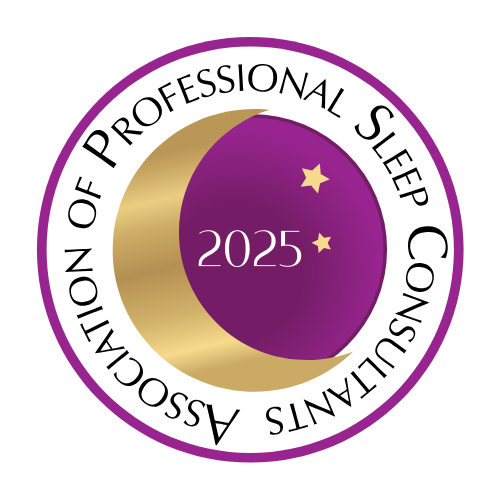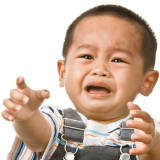Recognize baby dreams and avoid sleep issues
Author Name: Heidi Holvoet, PhD
Dreams - Nightmares - Night Terrors
Baby dreams, nightmares and night terrors can disturb your child's sleep. Recognizing the type of dream allows you to help your baby sleep well, in spite of them.
Dreaming is natural and has an important function in brain development from a very early age.
 photo
courtesy by
Mariana Braga
photo
courtesy by
Mariana Braga
Throughout
childhood and adult life, dreams are known to affect our
intellectual and emotional
wellbeing
.
A nightmare
is a scary dream.
A
night terror
is quite different: it is not a dream
but a confused state when waking from deep sleep.
Below is
an overview of
how to recognize dreams, nightmares and night
terrors
and how you can help.
How can you tell if your baby is dreaming?
A dream occurs
in a specific phase of sleep, called REM sleep - Rapid Eye Moment. A
sleeping baby spends more time in this phase than any other. And so she
spends more
time dreaming than not dreaming
.
During
the dream phase,
your child
appears very
active
: she'll make (funny) faces,
stretch and clutch fingers, wiggle arms and legs about, make soft
noises ...
If you look closely, you can see the
eyes move behind the eyelids
:
going quickly from left to right (that's the
rapid eye movement
).
How to avoid waking up from baby dreams?
(Why) Does a baby dream?
Do babies dream?
Yes, most sleep experts agree that babies dream. And the
younger, the more they dream ... even before being born.
Scientists have suggested that an unborn in the womb dreams almost all
the
time. The function of that prenatal dreaming would be for
brain development
.
[1-3]
A newborn still dreams most of the time when sleeping and so does a
young infant. The brain is still in full development.
Very gradually the amount of dreaming becomes less. Adults still dream,
but not most of the time. The function of dreams is then less obvious
but dealing with emotional situations is one of them ...
Most
dreams are gentle and won't disturb nap and nights.
But some babies wake themselves up from waving their arms and
legs about. Often this is just a short wake -
jumping up
- and
then they go back to sleep again.
Sometimes it wakes them up completely, over and over again. And
that can really make
falling
asleep difficult
- babies usually go straight to a dream
phase when drifting off.
To avoid your little one waking
herself up
:
- Tightly tuck her in , arms well tucked under the blankets and in the toe to feet position (feet at the foot end of the bed to avoid sliding under the covers for a safe baby sleep position ).
- Alternatively, use a sleeping bag . The right size sleeping bag gives a good tuck and nicely keeps her legs still.
- When you hold your little one while she drifts off, for example after feeding, hold her closely and securely her arms.
If she continues to wake up frequently, and your baby has the right age for it to be safe, consider swaddling I recommend checking with a medical professional to make sure swaddling is still safe for your baby.
Dreams - Nightmares - Night Terrors
Article Author: Heidi Holvoet, PhD - Founder, senior sleep consultant

Heidi Holvoet, PhD, is the founder of the Baby Sleep Advice website and movement, an award-winning author, baby & toddler sleep consultant with 17+ years experience as well as a certified lactation counselor.
Over the years, Heidi has received several awards inluding a Mom's Choice Award (MCA) and National Parenting Awards (NAPPA) for her Baby Sleep Advice website, programs and books. Also, Baby Sleep Advice was awarded "Most Trusted Infant's Sleep Solutions Company 2023" in the Benelux Enterprise Awards 2023.
Heidi continually conducts personal research and participates in continued education and in that way stays up to date with current scientific and pyschosocial infant care.

She is also a member of the Association of Professional Sleep Consultants of which she was one of the earliest contributors. She obtained her PhD degree in physics at the University of Ghent in Belgium.
Heidi is passionate about helping babies and their parents sleep more and better, with her trademark holistic and truly-no-tears approach that has been proven and praised time and again by parents worldwide to be effective and truly no-tears. Respect for you as a parent and your baby, is at the heart of Heidi's warm and kind support. Her approach always keeps in mind a baby's needs and abilities at any given age, is based on pediatric science and the most up to date knowledge in infant care and sleep science.
As well as the award-winning baby sleep programs, Heidi offers popular 1:1 consults and easy-access 30-minute SOS Sleep sessions.
[1]
Electroencephalography
Niedermeyer E., Da Silva F.L. - Lippincott Williams & Wilkins,
2005.
[2]
Ontogenetic Development of
the Human Sleep-Dream Cycle
Howard P. Roffwarg, Joseph N.
Muzio, and William C. Dement -
Science,
1966:
Vol. 152. no. 3722.
[3]
Neonatal
Electroencephalography
Dreyfus-Brisac C. -
Reviews in Perinatal Medicine
Vol. 3. p.397, 1979

Baby waking every hour?
by Heidi Holvoet, PhD

A Bedtime Routine: Settling To Sleep Like A Charm
by Heidi Holvoet, PhD

Separation Anxiety
by Heidi Holvoet, PhD

Colic
by Heidi Holvoet, PhD

Why does my baby wake up every hour?
by Heidi Holvoet, PhD


